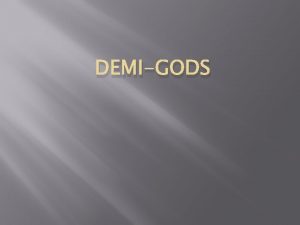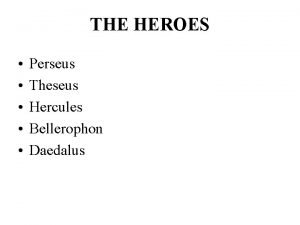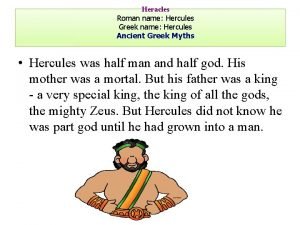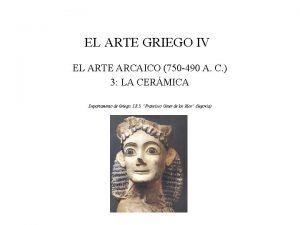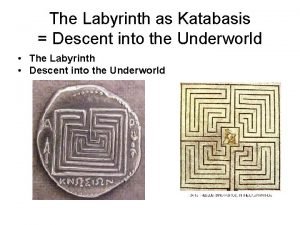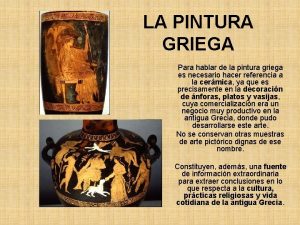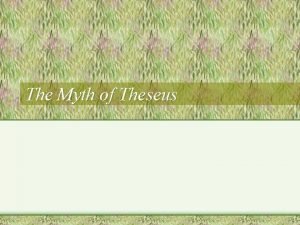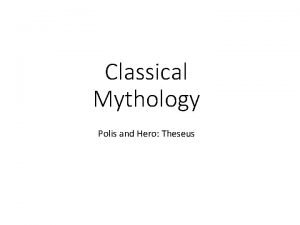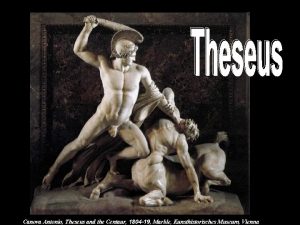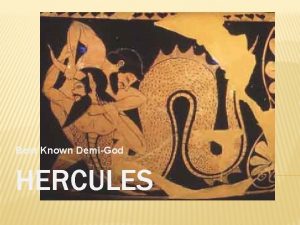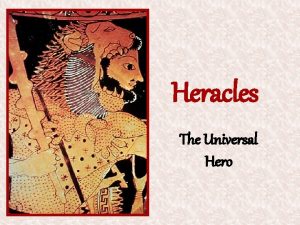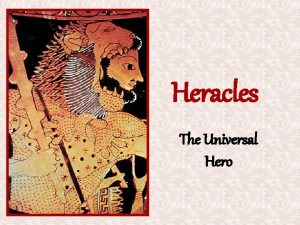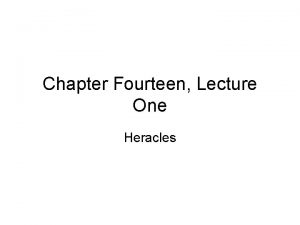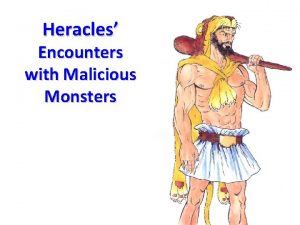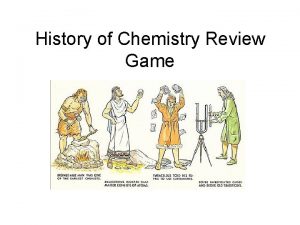DEMIGODS Famous Demigods Heracles Hercules Cuchulain Gilgamesh Theseus










- Slides: 10

DEMI-GODS

Famous Demi-gods �Heracles (Hercules) �Cuchulain �Gilgamesh �Theseus

Heracles time & life Myths were made up thousands of years ago. Was there a real Hercules, a man behind the stories? We will never know. Yet, his story is of a man who was so strong and brave, whose deeds were so mighty, and who so bore all the hardships that were given to him, that when he died, Hercules was brought up to Mount Olympus to live with the gods. Hercules was both the most famous hero of ancient times and the most cherished. More stories were told about him than any other hero. Hercules was worshipped in many temples all over Greece and Rome.

Heracles (Hercules)

Cuchulain, one of the greatest heroes of Irish mythology and legend, was a warrior in the service of Conchobhar, king of Ulster. Best known for his singlehanded protection of Ulster, Cuchulain is said to have lived in the first century B. C. , and tales about him and other heroes began to be written down in the A. D. 700 S. Cuchulain's quests were recorded in a series of tales known as the Ulster Cycle. Like many Irish heroes, Cuchulain had a short, adventurous, and tragic life. He was the son of Dechtire, sister of King Conchobhar. She and some of her handmaidens were captured on her wedding night by Lug, the sun god, who appeared to her as a fly. Dechtire swallowed the fly and later gave birth to a son whose original name was Setanta. From the beginning, the child possessed extraordinary powers. He could swim like a fish at birth. He had seven fingers on each hand, seven toes on each foot, and seven pupils in each eye. At the age of 7, he fought off 150 boy warriors to gain entrance to his uncle's court. When he was 12, Setanta accidentally killed the watchdog of the smith Cullan and offered to guard Cullan's property until another dog could be trained. It was at that time that he changed his name to Cuchulain, which means "hound of Cullan. " He grew up to be a handsome, well-spoken man who was very popular with women

Cuchulain

Gilgamesh Most tales about Gilgamesh are clearly myths, they may be based on a real historical number. Ancient lists of Sumerian kings classify Gilgamesh as an early ruler of the city of Uruk about 2600 B. C. These same texts, however, also say that Gilgamesh was a demigod and ruled for 126 years. According to legendary books, Gilgamesh was the son of the goddess Ninsun and of either Lugalbanda, a king of Uruk, or of a high priest of the district of Kullab. Gilgamesh's greatest accomplishment as king was the building of massive city walls around Uruk, an achievementioned in both myths and historical texts. Gilgamesh first seemed in five short poems written in the Sumerian language sometime between 2000 and 1500 B. C. The poems— "Gilgamesh and Huwawa, " "Gilgamesh and the Bull of Heaven, " "Gilgamesh and Agga of Kish, " "Gilgamesh, Enkidu, and the Nether World, " and "The Death of Gilgamesh"—tell various events and adventures in his life.

Gilgamesh

Theseus was Athens's great hero. While having all the makings of a old-style hero, such as strength and courage, he was also intelligent and wise. His early adventures helped the city and region. He was a successful king. He combined Athens's position in the region through sharp political directional. He led Athens's army on victorious campaigns. He is credited as the founder of Athens's democracy willingly turning many of his powers as king over to an elected assembly. He gained a standing for helping the poor and worried. His shedding of power also made it easier for him to continue going on adventures after he was king. "Not without Theseus" became a popular Athenian saying, shiny the belief he should be included in any important responsibility.

Theseus
